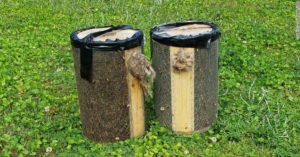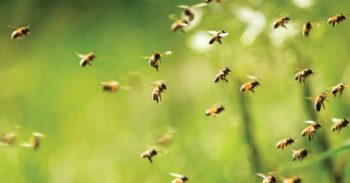 A woman was surprised to not just find a beehive in her home but one large enough to contain more than 100,000 bees. Even more surprising, this was not the first time it happened at this Georgia home.
A woman was surprised to not just find a beehive in her home but one large enough to contain more than 100,000 bees. Even more surprising, this was not the first time it happened at this Georgia home.
Wait… How Many Bees?!
Over the course of 14 years living in her Decatur, GA home, Lisa Ohmundt has found hives in her home four times. The first hive, which also contained more than 100,000 honeybees, was found and relocated in May 2017. A few years later, a smaller hive was found and also relocated.
All was well for a few years until yet another small hive was found about a week before this giant one. That was relocated – and then she discovered more bees! This time it was another enormous hive containing more than 100,000 bees.
Ohmundt discovered the infestation after noticing bees flying around her home and then disappearing. At times she would notice 20-25 or more bees around her sliding glass doors. A neighbor told her that the prior homeowner had the same issue.
The local bee experts Ohmundt consulted can’t figure out why honeybees love her house. It is especially odd since the typical beehive has around 40,000 bees… so two of the four Ohmundt discovered were highly unusual. Normally when a beehive gets too large, it splits, with a portion swarming and founding a new hive.
While we here at Arrow cannot say for sure why Ohmundt keeps having this problem (without examining her Georgia home), the most common reason for repeated bee infestations is a piece of honeycomb breaking off when the bees are relocated. It would contain pheromone scents that could attract a new group of bees swarming to find a home.
Ohmundt was not alone in this experience. Actress Constance Wu (Crazy Rich Asians, Fresh Off the Boat, Hustlers) talked to Jimmy Fallon on the May 21st episode of The Tonight Show about her own experience finding a beehive inside the walls of her California home.
How Can I Prevent Bees from Entering My Home?
Bees enter a home through holes as small as a quarter of an inch wide. Seal any holes in your home’s perimeter with caulk, metal screening, etc., as appropriate for the location to prevent insects or vermin of any kind from entering.
Keeping your yard and property clutter-free will also make it less likely that bees, wasps, hornets, or yellowjackets will form a colony on your property. That means they are less likely to enter your home.
Carpenter bees are far more likely to be a pest that invades your home than “regular” bees – meaning bumblebees or honeybees. Carpenter bees get their name because they bore into wood, creating tunnels in which they live instead of making hives. While they don’t eat the wood, they can cause a great deal of property damage to your home.
Wasps, yellowjackets, and hornets can also infest your property or home. While bees are generally only aggressive if agitated or to protect their colony, wasps, hornets, and yellowjackets can be quite aggressive, posing a serious problem on your property.
However, it can be difficult for the average person to tell the difference when one flies past quickly. That’s why if you’re concerned about any such infestation, it’s important to call the experts at Arrow. We can determine exactly what it is and recommend a plan of action.
Let Arrow Handle Your Carpenter Bees
If you think you have a carpenter bee, wasp, or yellowjacket problem, call Arrow Exterminating to identify and deal with them properly. For honeybees, we can recommend a local expert who will relocate the hive because bees are so important to the environment. To get started, contact Arrow Exterminating today.



